Overview
We recognize that digital care transformation is not just an option; it is a necessity for healthcare organizations striving for excellence. Our focus is to outline effective strategies that can lead to significant improvements in patient care and operational efficiency.
By leveraging technology, fostering collaboration, ensuring data security, and investing in training and engagement, we can enhance the overall healthcare experience. Supported by compelling examples and statistics, we illustrate the positive impacts these strategies can have.
What’s holding your team back from embracing this transformation? Let us guide you in adopting these essential strategies to elevate your organization’s capabilities and patient outcomes. Together, we can navigate the complexities of digital care and achieve remarkable results.
Introduction
In the dynamic landscape of healthcare, we recognize that digital transformation is not just a trend; it is a necessity for organizations striving to enhance patient care and operational efficiency.
As we face the dual challenge of integrating legacy systems with cutting-edge technologies, platforms like Avato emerge as vital allies in this journey.
By enabling seamless connections and ensuring robust data security, we empower healthcare organizations to navigate the complexities of digital integration.
This article explores the multifaceted approach required for successful digital care transformation, from investing in training and fostering collaboration to leveraging artificial intelligence and ensuring data privacy.
As the industry evolves, understanding these key strategies will be essential for healthcare leaders aiming to deliver exceptional care in an increasingly digital world.
Avato: Secure Hybrid Integration Platform for Digital Care Transformation
We emerge as a leading secure hybrid integration platform, crucial for digital care transformation within the medical field. By facilitating seamless connections between legacy systems and modern applications, we empower medical organizations to streamline operations and significantly enhance patient care. Our advanced security features safeguard sensitive health data, making us particularly suitable for the highly regulated healthcare environment. With the ability to achieve integration goals rapidly, we minimize the time and costs typically associated with digital care transformation projects, maximizing and extending the value of legacy systems.
What’s holding your team back? Recent statistics reveal that numerous entities struggle with innovation due to an overabundance of experts who inadvertently hinder progress. We address this challenge by simplifying complex integration processes, allowing service providers to focus on delivering quality care and fostering innovation. As Peter Diamandis aptly noted, “Companies have too many experts who block innovation. True innovation really comes from perpendicular thinking.” This viewpoint corresponds with our mission to simplify integration, enabling medical entities to innovate effectively.
As the North American area expects substantial expansion in medical cloud computing, propelled by modernization investments, we establish ourselves as an essential ally for entities seeking to adjust to changing requirements. By utilizing our capabilities, healthcare providers can not only enhance operational efficiency but also attain improved care outcomes, ensuring they stay competitive in a swiftly evolving environment.
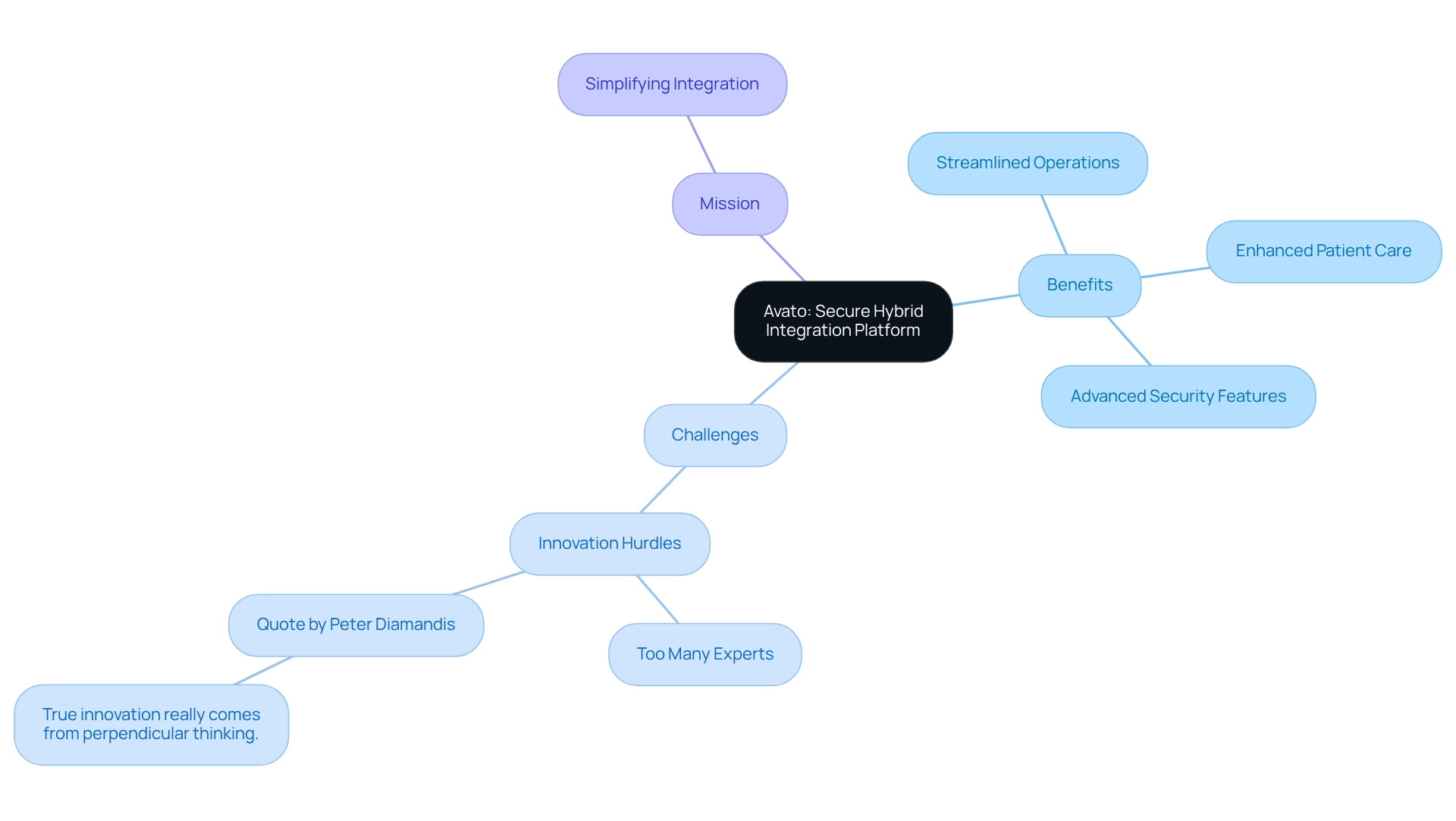
Invest in Digital Care Transformation Models
We must prioritize funding in proven digital care transformation frameworks that align with our strategic goals. These models serve as essential frameworks for integrating technology into care delivery, enhancing patient engagement and improving operational efficiency. By adopting best practices from successful implementations, we can significantly reduce risks and amplify the benefits of digital transformation. This strategic investment not only meets our current operational objectives but also prepares us to embrace future developments in medical technology.
Notably, successful health systems are increasingly focusing on upgrading legacy infrastructure to remove barriers and maximize impact. As Karl Kellner, Senior Partner at McKinsey, stated, “Successful health systems will invest in areas with the greatest potential impact while removing barriers—for example, by upgrading legacy infrastructure.”
Furthermore, with the increasing digitization of healthcare data, prioritizing cybersecurity measures is essential to safeguard sensitive individual information and uphold trust. A case study titled ‘Addressing Security Concerns in Healthcare’ underscores our need to prioritize cybersecurity measures to protect sensitive information and maintain trust.
As we navigate this digital care transformation, it will be essential to align virtual care models with our overarching strategic objectives for attaining sustainable success. Our dedicated hybrid integration platform plays a crucial role in this landscape by simplifying the integration of diverse systems, thereby enhancing operational efficiency and enabling us to focus on delivering better patient care.
For banking IT managers, grasping these transformation models can offer insights into how comparable strategies can be implemented to improve operational efficiency and security within their own organizations.
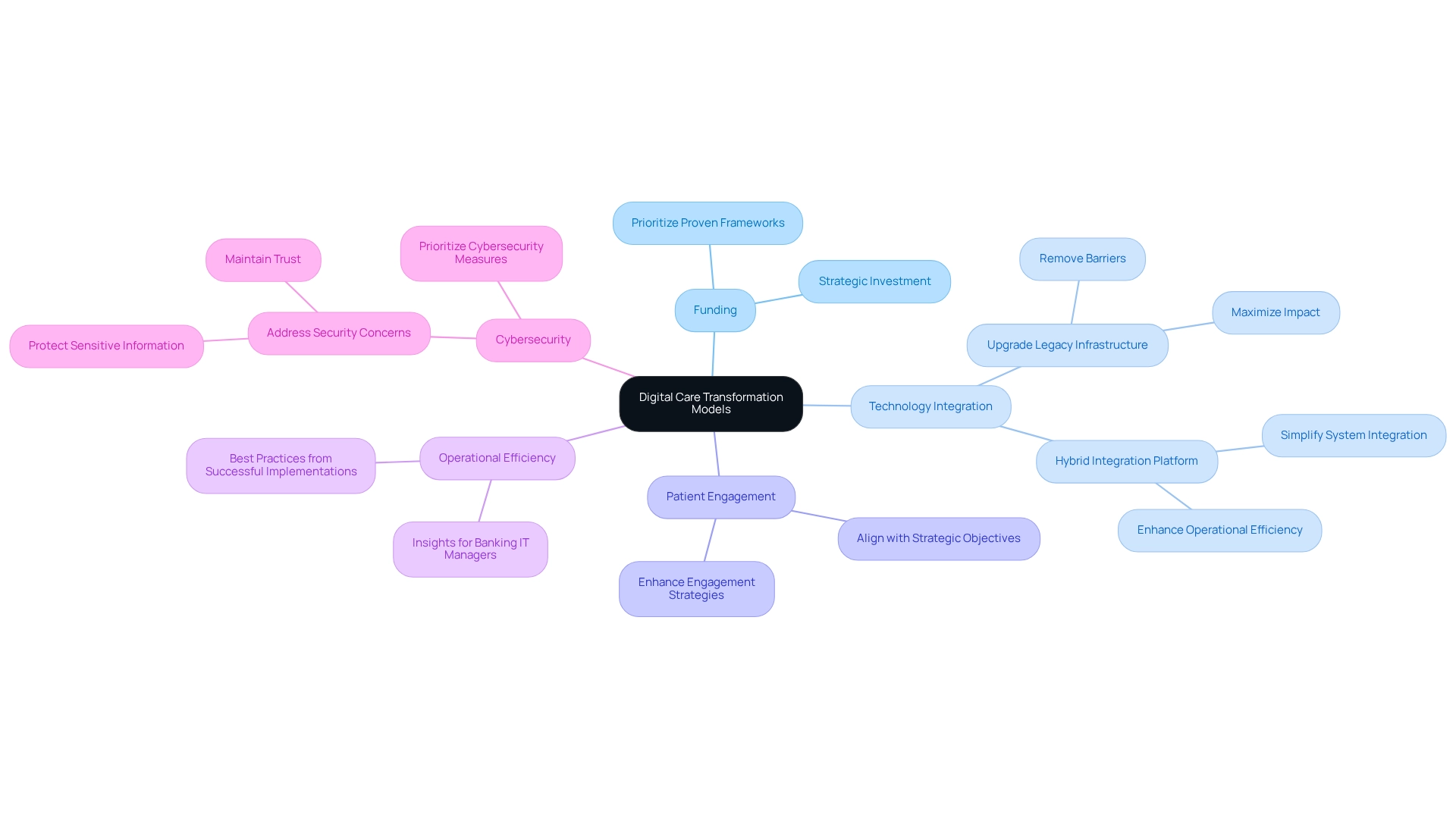
Foster Collaboration Through Co-Creation
Encouraging teamwork through co-creation is paramount for achieving successful digital care transformation. By involving medical professionals, individuals, and technology suppliers in the creation and execution of digital care transformation solutions, we ensure that the resulting systems are not only user-friendly but also efficient in addressing real-world requirements. This collaborative approach enhances care quality and builds trust among stakeholders, which is crucial for the digital care transformation and the adoption of new technologies.
By prioritizing co-creation, we can contribute to digital care transformation, developing solutions that genuinely address community needs and ultimately leading to improved patient outcomes and satisfaction. The significance of co-creation is underscored by expert opinions, such as that of Peter Fleischut, MD, who asserts that technology should serve people and processes rather than exist for its own sake. This perspective aligns with the growing recognition that medical innovation must prioritize user experience to drive adoption and effectiveness.
Furthermore, statistics reveal that stakeholder engagement in electronic health initiatives greatly enhances the chances of successful implementation; for instance, projects with high stakeholder participation are 70% more likely to thrive, emphasizing the necessity for collaborative efforts in the realm of digital care transformation.
Successful instances of co-creation in healthcare technology development illustrate its advantages. The advancements in digital medicine, particularly through the use of AI and VR, showcase how digital care transformation can personalize care. For example, virtual reality has been shown to lessen pain perception in children during medical procedures, while AI can offer tailored guidance to individuals, improving their treatment experience.
The incorporation of retail ideas into medical services has emerged as a notable disruptor, highlighting convenience for individuals and necessitating that medical systems adapt through collaborative efforts to consumer needs. As Charles Darwin wisely observed, survival depends on adaptability to change—a principle that resonates deeply in the context of digital care transformation in health.
By embracing co-creation, we can not only enhance our technological capabilities but also ensure that these advancements align with the evolving needs of our clients and communities.
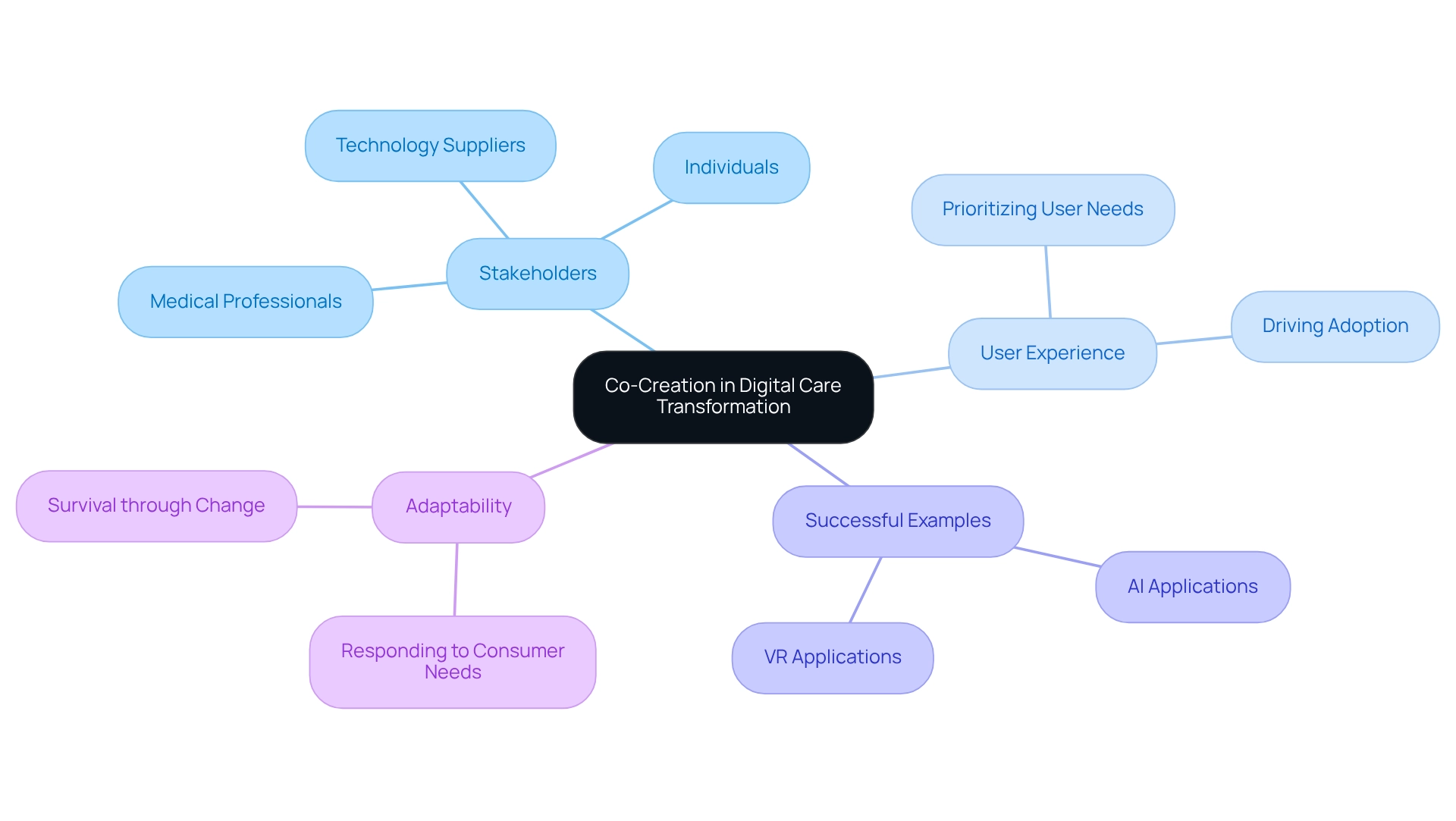
Implement Real-Time Monitoring and Alerts
Implementing real-time monitoring and alerts is essential for enhancing care as part of digital care transformation in health environments. Advanced monitoring systems empower us to continuously monitor vital signs and system performance, facilitating prompt responses to anomalies. This proactive approach significantly lowers the risk of complications and improves outcomes for individuals. For instance, the University of Pittsburgh Medical Center reported an impressive 76% decrease in hospital readmissions through the use of remote monitoring (RPM) equipment, demonstrating the effectiveness of these systems. Moreover, satisfaction scores at the center have increased to over 90%, emphasizing how real-time monitoring directly contributes to enhanced experiences for individuals.
Furthermore, real-time notifications enhance workflows, enabling our medical teams to prioritize essential tasks while ensuring timely actions for individuals. The integration of intelligent alert systems, powered by AI, is poised to transform care for individuals, with projections indicating that 40% of healthcare practices will incorporate AI into RPM solutions by 2030. This evolution highlights the necessity for banking IT managers to consider how similar technologies can be utilized in their own sectors to improve operational efficiency and engagement. As noted by Gustavo Estrada, a customer, “Avato has the ability to simplify complex projects and deliver results within desired time frames and budget constraints,” underscoring the importance of efficient integration in achieving these advancements.
The global remote individual monitoring market is anticipated to expand at a compound annual growth rate (CAGR) of approximately 20% from 2023 to 2028, indicating the rising need for RPM solutions. This growth highlights the essential function of real-time monitoring systems in healthcare, as they not only boost satisfaction but also play a critical role in digital care transformation by improving overall care quality through timely alerts and interventions. The advancements in digital care transformation, particularly through AI and VR, further humanize care by offering innovative solutions that cater to individual needs and enhance accessibility to health data. For example, applications like SimCoach utilize virtual avatars to support veterans with PTSD, showcasing how technology can create empathetic interactions that traditional methods may lack. Furthermore, the idea of an open-data future is crucial; enabling individuals to access their health information can result in more personalized care and improved health outcomes.
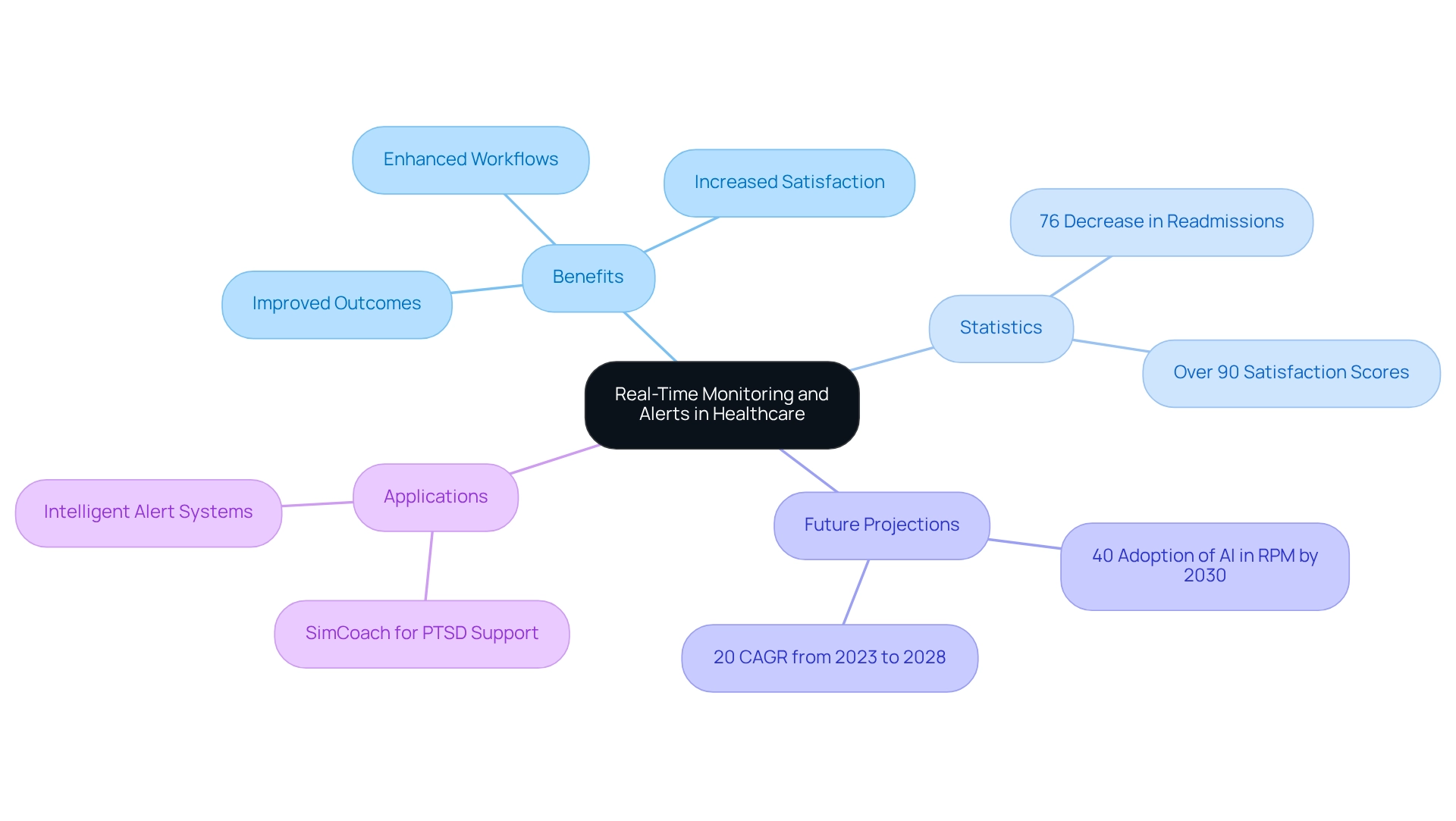
Leverage Artificial Intelligence for Enhanced Patient Outcomes
Incorporating artificial intelligence (AI) into medical systems significantly enhances outcomes for individuals by improving diagnostic precision and customizing treatment strategies. At Avato, we recognize that our Secure Hybrid Integration Platform is pivotal in the digital care transformation. By maximizing and extending the value of legacy systems, simplifying complex integrations, ensuring 24/7 uptime and reliability for critical medical operations, and providing real-time monitoring and alerts on system performance, we empower healthcare providers to deliver exceptional care.
AI algorithms efficiently analyze extensive individual data, identifying patterns and predicting health risks, which facilitates proactive care. For instance, a notable case study reveals that 52% of medical professionals view AI-driven skin cancer detection as a major breakthrough. This statistic underscores the technology’s potential to improve early detection and treatment.
Furthermore, AI-driven tools enable medical practitioners to make informed decisions, streamline administrative tasks—such as automating appointment scheduling and follow-ups with clients—and enhance engagement. As medical professionals increasingly acknowledge the necessity for AI to optimize workflows and client outcomes, we anticipate a significant growth in the adoption of these technologies. In fact, 23% of individuals believe that AI chatbots should be accessible to everyone, even those not currently seeing a therapist, reflecting a growing acceptance of AI’s role in patient care.
Gustavo Estrada, a valued client, remarked, “Avato has simplified complex projects and delivered results within desired time frames and budget constraints.” This statement emphasizes the effectiveness of our platform in medical integration.
By effectively integrating AI into operations, we enable medical organizations to achieve digital care transformation, which elevates the quality of care while reducing costs and enhancing overall efficiency, positioning themselves for success in an evolving landscape. This integration also holds implications for banking IT managers, as improved data management through AI can lead to better compliance and security in handling sensitive information.
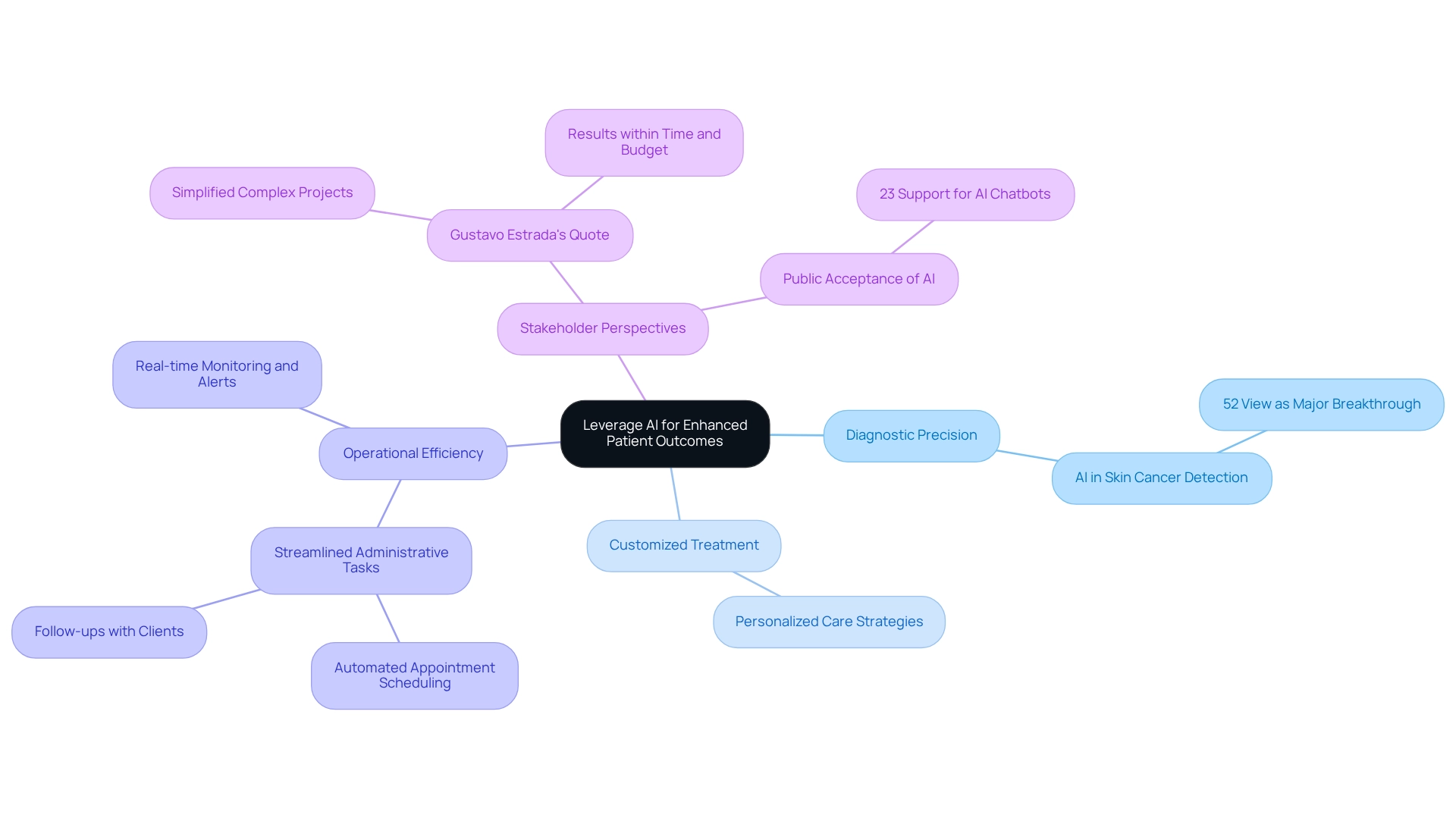
Ensure Data Privacy and Security
In the digital care transformation of medical services, ensuring data privacy and security is not merely a regulatory requirement; it is a fundamental necessity. We must adopt robust security measures to protect sensitive individual information from breaches and unauthorized access. Key strategies include:
- Implementing advanced encryption technologies: Essential for protecting data integrity, staff training ensures that our employees understand how to utilize these technologies effectively.
- Conducting regular security audits: To identify vulnerabilities and strengthen defenses, training programs prepare our staff to recognize potential risks during audits.
- Training staff on data protection protocols: Human error remains a significant factor in data breaches, making staff training crucial. Investing in extensive training initiatives customized for our hybrid integration platform guarantees that our team is at ease with the new system and comprehends the significance of following data protection protocols.
Statistics indicate that over 90% of cyberattacks aimed at medical entities are phishing scams, as highlighted by Megan Garza, Communications Manager for Varonis. This underscores the need for heightened vigilance and proactive measures. By emphasizing data protection, we can not only adhere to regulatory standards but also establish trust with patients, creating a safer online environment for all parties involved.
Effective approaches for safeguarding patient information in electronic health include utilizing security AI and automation, which allow us to detect and manage breaches more rapidly. Indeed, entities that succeed in controlling data breaches in less than 200 days can conserve an average of $1.02 million compared to those with extended containment periods, highlighting the monetary consequences of efficient breach management, especially as we progress deeper into 2025, where the focus on digital care transformation and data privacy in medical practices continues to increase. Significantly, 94% of entities collaborating with outsourcing firms allow them system access, with 72% offering advanced permissions. This underscores the importance of implementing stringent access controls and monitoring systems to mitigate risks associated with third-party access. By embracing these optimal methods, we can efficiently manage the intricacies of transformation while safeguarding patient information.
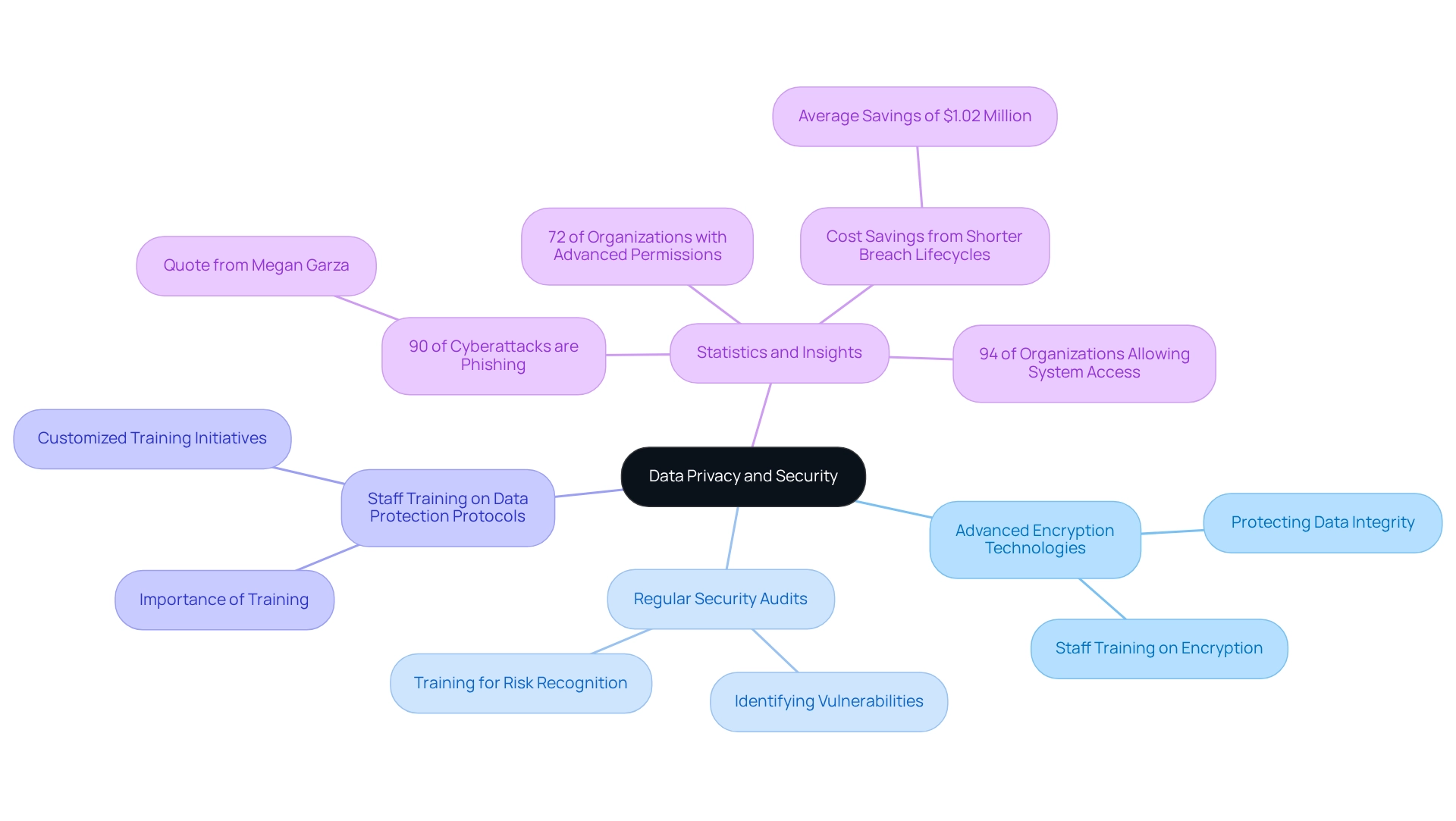
Develop a Comprehensive Digital Transformation Roadmap
Developing a thorough digital care transformation plan is crucial for medical institutions aiming to efficiently incorporate new technologies. This roadmap delineates specific objectives, timelines, and key performance indicators (KPIs) to track progress. Involving stakeholders in the planning process is essential; it guarantees that the roadmap aligns with strategic objectives and addresses the unique challenges encountered in the medical field. A well-designed roadmap not only enables smoother transitions but also promotes accountability and transparency throughout the transformation journey.
Healthcare leaders must adapt to change and embrace new technologies. Entities that are digitally advanced report being 23% more profitable than their less advanced peers. Successful planning for technology integration in the medical field is crucial for digital care transformation, as it demonstrates that a clear roadmap can significantly mitigate challenges such as high upfront costs and the need for specialized IT skills. Notably, a survey revealed that smaller entities often manage technological transformation more effectively than larger companies, which face major obstacles like a deficiency in IT skills and substantial initial expenses. This underscores the importance of tailored strategies that consider organizational size and capacity.
Incorporating a hybrid integration platform like Avato’s can further enhance this roadmap, providing a reliable foundation for seamless data and system integration. Such platforms empower medical organizations to connect fragmented legacy systems, enabling them to scale with emerging technologies like AI and VR. Specialist views emphasize the importance of a transformation plan in the context of digital care transformation in the medical field. As Alison Corcoran, CMO and President of DentaQuest, highlights, while technology is not the primary driver, it is critical for integrating online and offline efforts. This perspective strengthens the notion that a strategic approach to technology integration is essential for achieving desired results in medical environments. By creating a robust transformation roadmap, we position ourselves for success in an increasingly complex technological landscape.
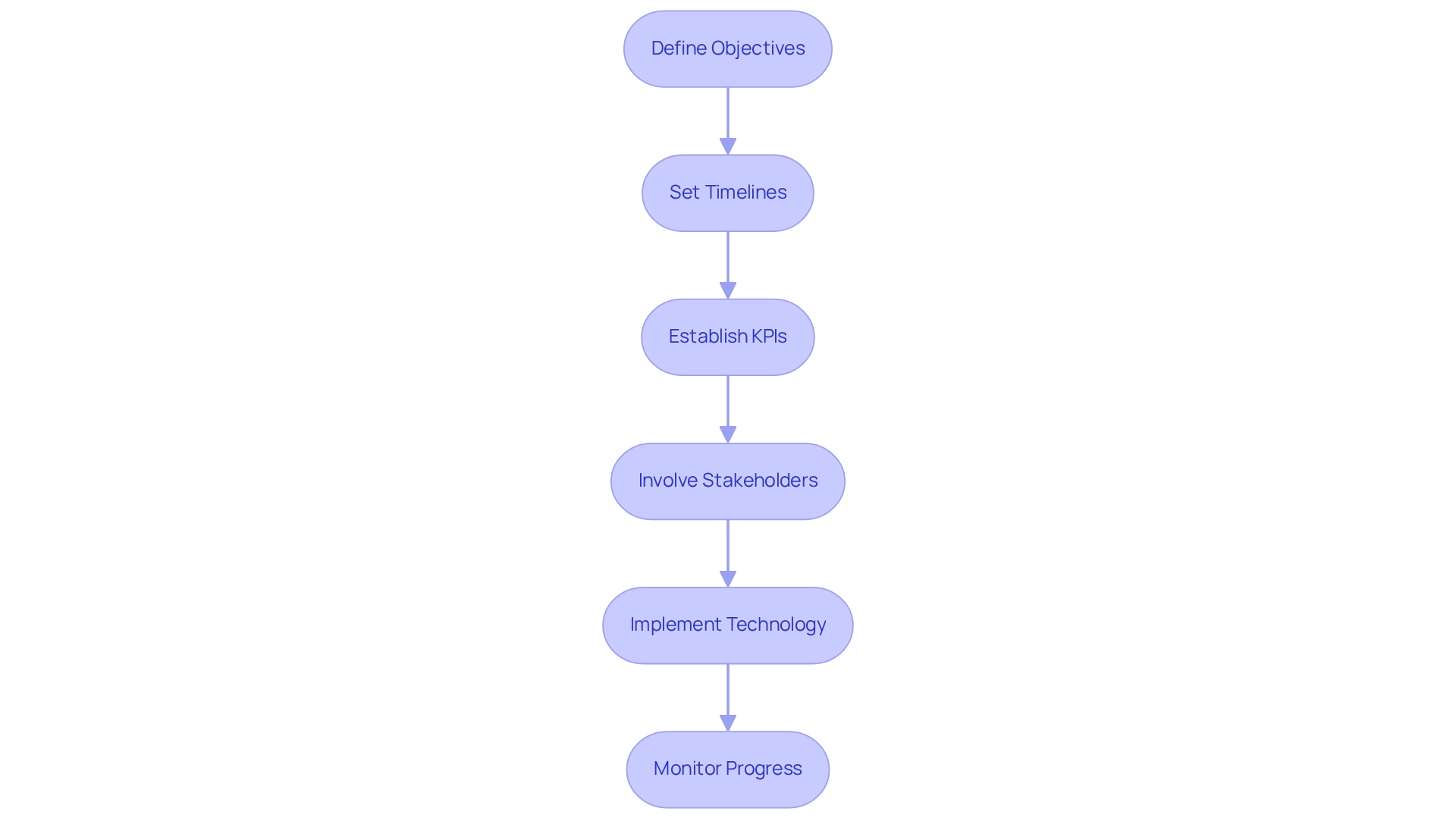
Invest in Training and Upskilling Healthcare Professionals
Investing in the training and upskilling of medical professionals is not just beneficial; it is essential for the success of our digital transformation initiatives. As healthcare systems increasingly integrate advanced technologies, it is imperative that our staff are equipped with the necessary skills to effectively utilize tools such as electronic health records, telehealth platforms, and data analytics. A culture of ongoing education enhances employee confidence and skills, leading to better care for individuals and improved operational effectiveness.
Current statistics indicate that organizations prioritizing staff training experience a significant enhancement in their digital care transformation. Successful upskilling programs demonstrate that well-trained staff can adapt more swiftly to new technologies, which is essential for digital care transformation and ultimately results in better patient outcomes. By 2025, we anticipate a heightened focus on upskilling in medical technology, propelled by the rapid advancement of IT within the medical field, reshaping hospital operations into a more patient-centered model.
Specialist perspectives underscore the importance of preparing medical practitioners for technological instruments. Tressa Springmann, Chief Information and Digital Officer, notes that “the cat’s out of the bag here on consumerism. Patients are going to drive us based on their comfort and utilization of technology.” This highlights our necessity to ensure that our teams are skilled in the latest technologies to facilitate digital care transformation and meet patient expectations.
Furthermore, case studies reveal that entities employing effective training strategies not only enhance their operational capabilities but also reduce expenses related to digital care transformation. For instance, Tony LeBlanc from the Provincial Health Services Authority states, “Good team. Good people to work with. Extremely professional. Extremely knowledgeable.” We distinguish ourselves by enhancing the capabilities of legacy systems and ensuring continuous uptime for essential integrations, which is vital for medical entities navigating the complexities of technological integration. Our hybrid integration platform accelerates secure system integration, allowing medical entities to streamline varied systems and enhance business value. By maximizing the potential of our workforce through targeted training initiatives, we empower medical organizations to navigate the intricacies of digital care transformation with greater ease, ensuring they remain competitive in an ever-evolving landscape.
Additionally, consulting healthcare professionals before initiating new activities or treatments is crucial. This practice guarantees that our training programs meet the real requirements of our staff and the individuals they support, fostering a more efficient and knowledgeable approach to transformation.
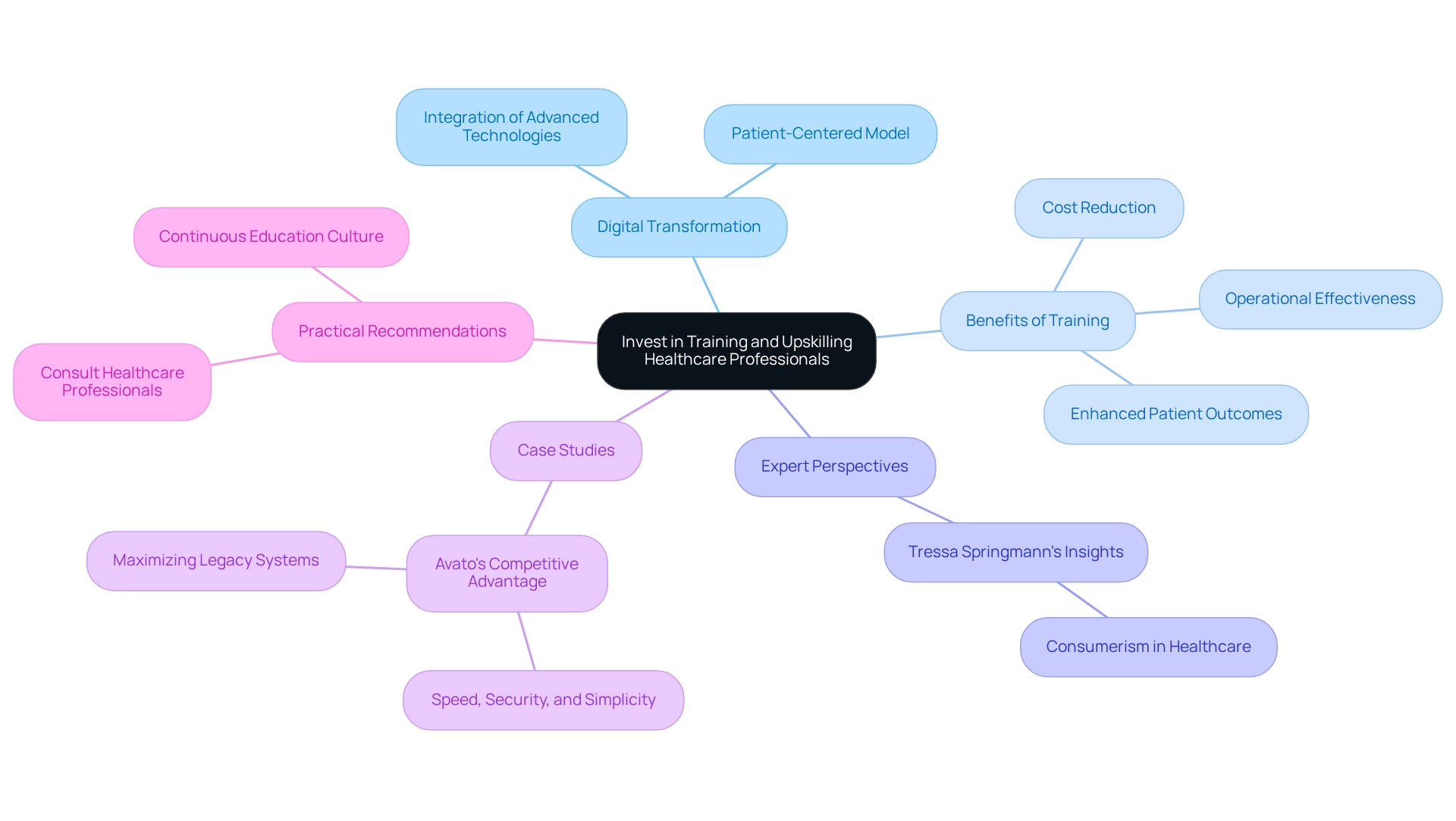
Enhance Patient Engagement Strategies
Enhancing client engagement strategies is pivotal for improving health outcomes and ensuring satisfaction. We recognize that healthcare institutions must utilize online tools such as client portals, mobile applications, and telehealth services to support their digital care transformation and enhance communication and interaction with clients. These tools empower individuals to take an active role in their care by providing easy access to their health information and encouraging feedback. Significantly, progress in electronic medicine, including the use of artificial intelligence (AI) and virtual reality (VR), is driving digital care transformation by introducing innovative methods to involve individuals and humanize healthcare experiences. For instance, AI can serve as a reliable consultant, offering tailored insights into treatment choices, while VR can assist individuals in coping with discomfort and stress during medical procedures.
The extent of these strategies is underscored by the Updox database, which contains engagement information for 150 million individuals, demonstrating the extensive use of electronic engagement tools. Furthermore, effective engagement strategies in the context of digital care transformation must address challenges such as health literacy gaps and restricted access to technology. By providing educational materials in various formats and programs to enhance broadband access, we can ensure that all individuals engage in electronic healthcare, contributing to the digital care transformation. Engaged involvement, such as exploring circumstances and joining support groups, further assists individuals in customizing their care to meet their unique requirements.
Data indicates that 29% of participants believed they were missing fundamental information to comprehend suggested treatments, highlighting the essential need for enhanced communication approaches. This statistic emphasizes the link between health literacy gaps and the necessity for improved electronic communication tools. By fostering a cooperative atmosphere through these technological resources, we can significantly enhance the overall experience and satisfaction of individuals in our digital care transformation.
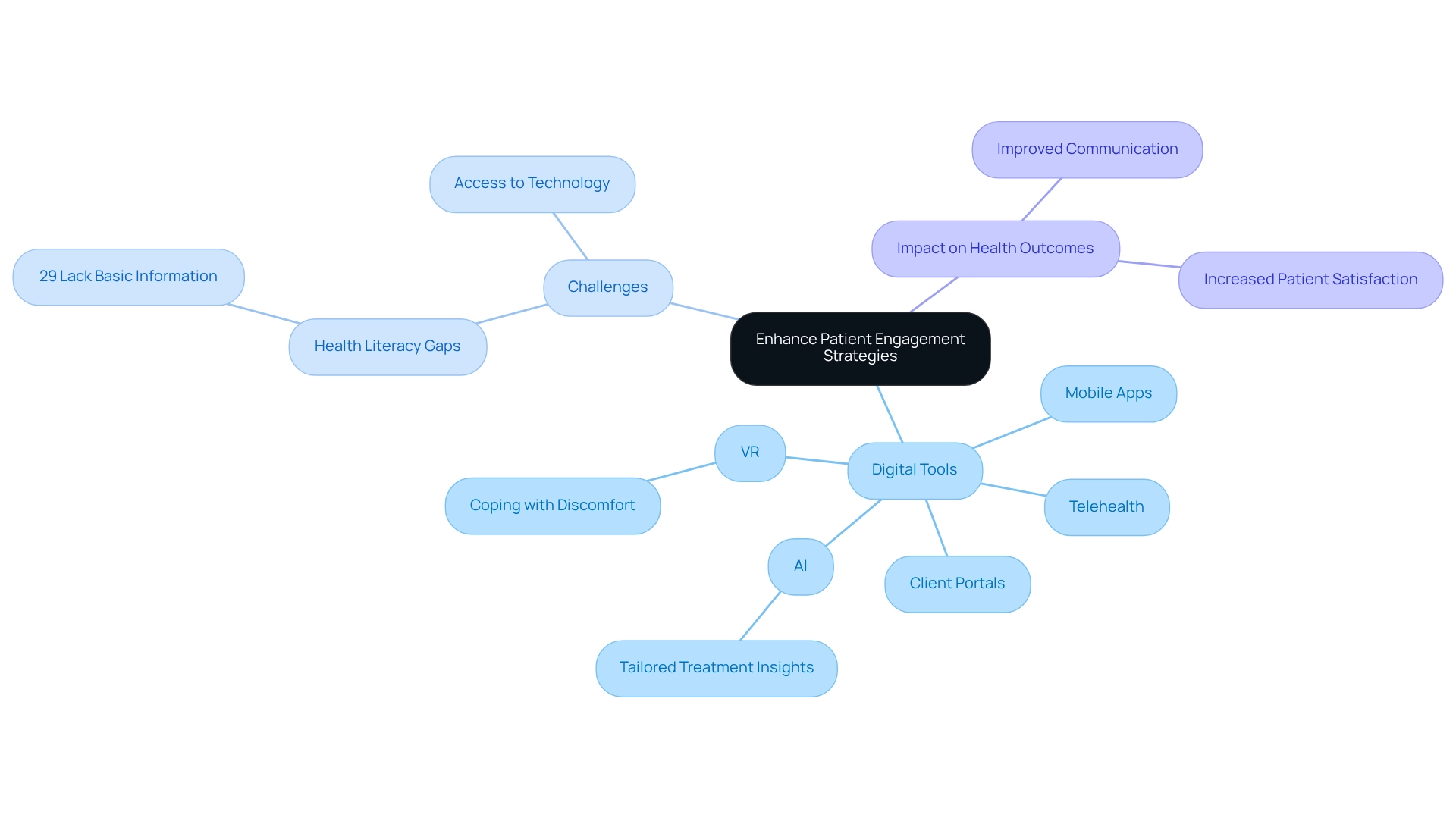
Continuously Evaluate and Improve Digital Care Initiatives
Continuous assessment and improvement of technological care initiatives are paramount for sustaining their effectiveness and relevance in the rapidly changing healthcare environment. We must adopt robust metrics to evaluate the impact of digital solutions on health outcomes and operational efficiency. Consistent feedback from both our personnel and clients serves as a vital resource for identifying areas that require enhancement. By fostering a culture of ongoing improvement, we can swiftly adapt to evolving medical demands and technological advancements, ultimately leading to superior care provision and increased patient satisfaction.
For instance, the BC Provincial Health Services Authority effectively updated its operations by unifying separate systems through Avato’s hybrid integration platform. This not only streamlined their integration efforts but also provided strong analytics features for continuous oversight. As a result, they optimized operations and significantly enhanced their operational capabilities. This case exemplifies how effective digital care transformation initiatives can yield improved connected experiences in medical services. Furthermore, statistics indicate that organizations adopting continuous improvement strategies in health technology experience a notable increase in the effectiveness of their digital care transformation efforts. As AI and automation become essential to addressing the growing demands for precision medicine and enhancing medical efficiency, the importance of ongoing assessment cannot be overstated. By prioritizing these practices and leveraging Avato’s dedicated hybrid integration platform, we can ensure that we remain at the forefront of innovation, ultimately benefiting both our patients and the broader healthcare system.
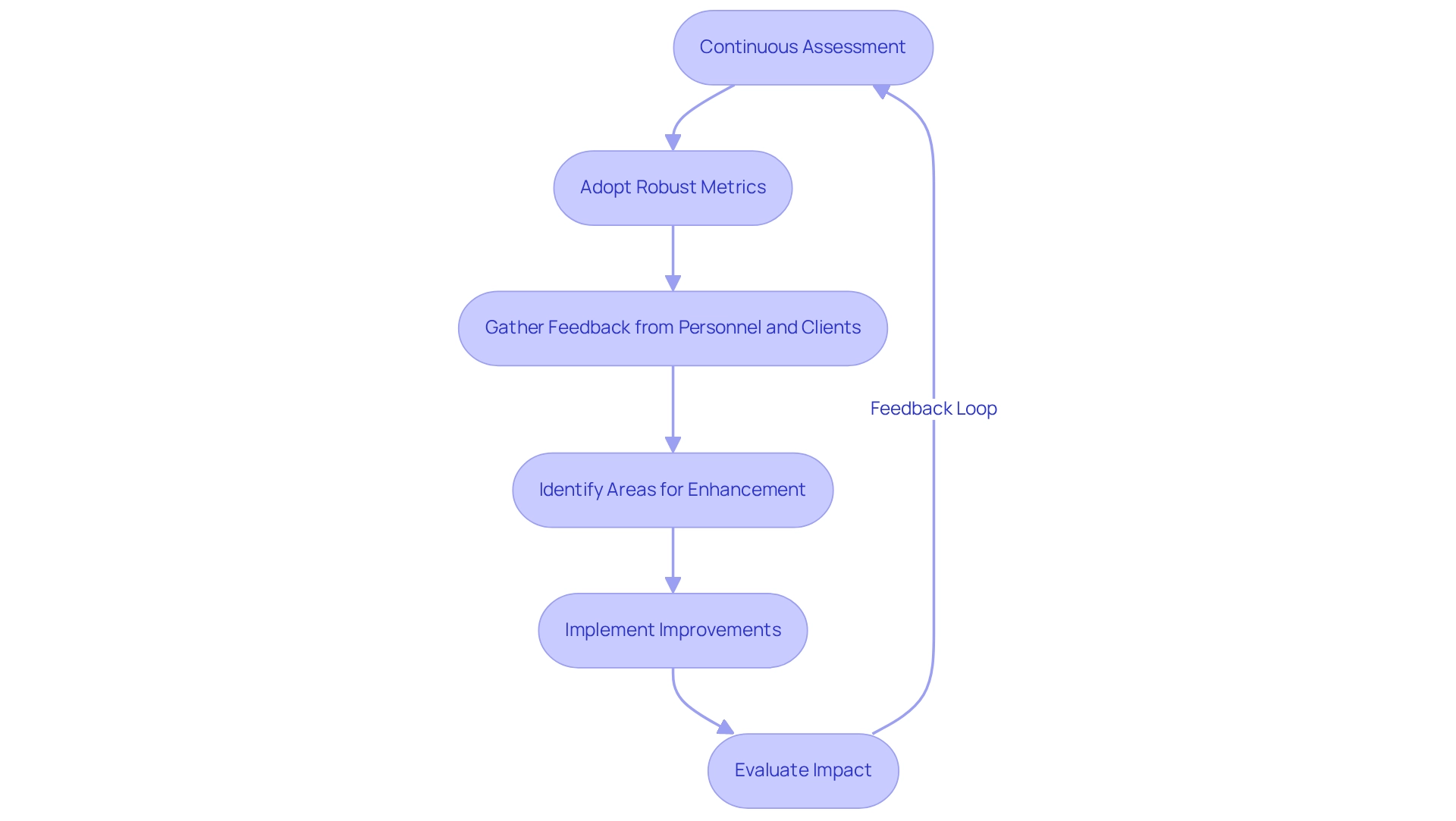
Conclusion
Digital transformation in healthcare is not merely an option; it is a critical pathway to enhancing patient care and operational efficiency. We recognize that platforms like Avato play a pivotal role in bridging the gap between legacy systems and modern technologies, enabling seamless integration and robust data security. By focusing on key strategies such as:
- Investing in digital care models
- Fostering collaboration through co-creation
- Implementing real-time monitoring systems
we can effectively navigate the complexities of this transformation.
Furthermore, leveraging artificial intelligence and prioritizing data privacy are essential components that not only safeguard sensitive information but also improve patient outcomes through personalized care. Continuous evaluation of digital initiatives ensures that we remain adaptable and responsive to the evolving landscape, ultimately fostering an environment of trust and satisfaction among patients.
As we embark on this transformative journey, it is imperative to recognize that embracing technology is not the end goal but a means to deliver exceptional care. By aligning technological advancements with strategic objectives and investing in the training of healthcare professionals, we can position ourselves for long-term success in an increasingly digital world. Our commitment to these principles will not only enhance operational capabilities but also ensure that patient care remains at the forefront of healthcare innovation.

